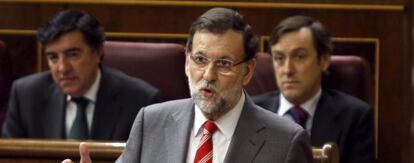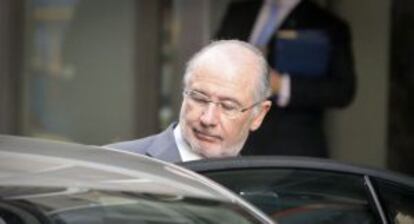PM defends tax amnesty and decision to keep beneficiaries’ names secret
Mariano Rajoy says he found out about Rodrigo Rato’s arrest through the media

Prime Minister Mariano Rajoy on Wednesday addressed Congress to defend his government’s 2012 tax amnesty and his party’s refusal to publicize the names of the people who applied for it.
Rajoy told Socialist leader Pedro Sánchez that the €124 billion that the state collected through the procedure justifies the move. He also compared it with earlier tax amnesties offered by Socialist governments.
Some PP officials believe Rato is being dragged through the mud to show the party will not tolerate wrongdoing by anyone
“Our regularization does not wipe out crimes,” said the Popular Party (PP) leader, a reference to the fact that around 715 individuals who legalized their tax situation in 2012 are now being investigated for possible money laundering.
His deputy, Soraya Sáenz de Santamaría, added that the PP’s amnesty was very different from the Socialist amnesties of 1984 and 1991, which she described as “opaque” and “lacking any control.”
But the Socialist leader insisted that the names of all the amnesty beneficiaries must be made public. One of these people is Rodrigo Rato, a former senior PP official and ex-managing director of the International Monetary Fund who is also on the list of 715 money laundering suspects.
Rato was briefly arrested last week after the Madrid Attorney’s Office filed charges of tax fraud, asset stripping and money laundering against him. His Madrid home and office were searched in a highly publicized operation that the prime minister said he had no early knowledge of.
“Everyone knows that I am a friend of his, and I can say that it was a great blow, but this was an independent action by the Tax Agency and the police; the government had nothing to do with it and I found out about it through the media,” Rajoy said at a meeting of business leaders in Madrid on Tuesday.
The issue of Rato’s downfall had been raised by María Dolores Dancausa, managing director of Bankinter, who wondered whether the former economy minister and deputy prime minister was being judged ahead of time.
While nobody will come out and say it, several PP officials privately believe that the man once described as the architect of Spain’s economic miracle is being dragged through the mud to convey the sense that the PP will not tolerate wrongdoing, not even by a former party heavyweight.

With local and regional elections coming up in May, and a general election in November, the ruling conservatives are struggling to shake off the negative effects of major corruption scandals such as Gürtel and Púnica.
These and other cases affecting the PP and its main rival, the Socialist Party – itself laboring under the effects of the ERE case in Andalusia – are believed to be behind growing voter support for political newcomers Podemos and Ciudadanos.
Tu suscripción se está usando en otro dispositivo
¿Quieres añadir otro usuario a tu suscripción?
Si continúas leyendo en este dispositivo, no se podrá leer en el otro.
FlechaTu suscripción se está usando en otro dispositivo y solo puedes acceder a EL PAÍS desde un dispositivo a la vez.
Si quieres compartir tu cuenta, cambia tu suscripción a la modalidad Premium, así podrás añadir otro usuario. Cada uno accederá con su propia cuenta de email, lo que os permitirá personalizar vuestra experiencia en EL PAÍS.
¿Tienes una suscripción de empresa? Accede aquí para contratar más cuentas.
En el caso de no saber quién está usando tu cuenta, te recomendamos cambiar tu contraseña aquí.
Si decides continuar compartiendo tu cuenta, este mensaje se mostrará en tu dispositivo y en el de la otra persona que está usando tu cuenta de forma indefinida, afectando a tu experiencia de lectura. Puedes consultar aquí los términos y condiciones de la suscripción digital.








































